

Public relations account executive job profile. Public relations account executives manage the information between organisations or individuals and the general public.
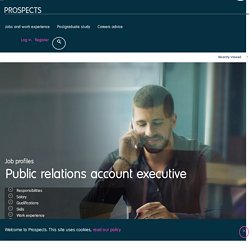
They promote their clients to their intended audiences through news items, press releases and product placements. A PR account executive works within a wider team and aims to influence public opinion or behaviour without the use of paid advertising. By generating positive news coverage, achieving product placement without payment in broadcast, print and new media, and placing spokespeople as commentators, a PR account executive works to proactively promote the profile and reputation of their clients. Responsibilities The work of a public relations (PR) account executive is likely to vary from day-to-day, depending on the organisation and sector. PR agencies often specialise in specific industry sectors, such as consumer, business-to-business (B2B), financial or healthcare.
Tasks typically involve: Salary Income figures are intended as a guide only. Working hours What to expect. Public relations officer job profile. Public relations (PR) officer: job description. Public relations officer Job Information. Page Content Public relations officer Hours30-40 per weekStarting salary£18,000 + per year.
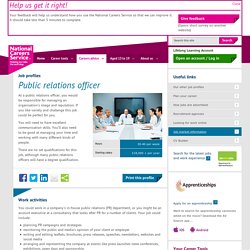
Political party agent: job description. What does a political party agent do?
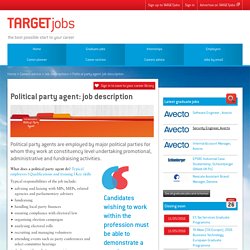
Typical employers | Qualifications and training | Key skills Typical responsibilities of the job include: advising and liaising with MPs, MEPs, related agencies and parliamentary advisers fundraising handling local party finances ensuring compliance with electoral law organising election campaigns analysing electoral rolls recruiting and managing volunteers attending events such as party conferences and select committee hearings dealing with media/press enquiries producing press releases and passing information to press agencies keeping membership records undertaking a wide range of administrative tasks including enquiries, producing agendas, organising/attending meetings and writing reports/minutes communicating with relevant official bodies Typical employers of political party agents Political parties represented in parliament employ party agents, who are mostly based at party headquarters (usually in capital cities).
A Day in The Life Of A Content Brand Manager. AdvertisingMarketingPR PR. Leeds University Library /All Locations. Getting into… the PR industry. A Day In The Life Of A Senior Digital PR Executive. University of Leeds Careers Centre Blog. Jessie Powell recently graduated with a degree in Politics, and is now a PR Account Executive with KOR Communications.

Here she explains how getting involved in a range of things at university helped her explore different career ideas and land her current job. Working and earning my own money had been important to me since a young age, so when I began studying for my degree in Politics, I continued to work as a sales assistant at Paperchase, as I had done whilst at school. I was keen to develop a strong body of real work experience alongside my academic profile and this was a positive starting point for doing so. Gaining experience to complement my studies I made sure to gain experience that would complement my course. This position gave me a real insight into the working life of government, an environment that I had previously seen myself pursuing a career in. From research to communications Finding further opportunities to enhance my experience Finding my current job Like this:
Playing the internship game: How I got my job in PR & Communications. Iain Waterman graduated with a degree in History from the University of Leeds in 2012.
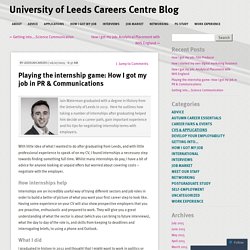
Here he outlines how taking a number of internships after graduating helped him decide on a career path, gain important experience and his tips for negotiating internship terms with employers. With little idea of what I wanted to do after graduating from Leeds, and with little professional experience to speak of on my CV, I found internships a necessary step towards finding something full time. Whilst many internships do pay, I have a bit of advice for anyone looking at unpaid offers but worried about covering costs – negotiate with the employer. How I got my placement as a Press Office Assistant. Hannah Cowton (studying Theatre & Performance at Leeds) is currently on placement as a Press Office Assistant in the PR Department at Kia Motors UK.
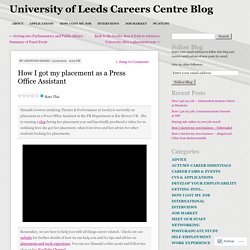
She is running a vlog during her placement year and has kindly produced a video for us outlining how she got her placement, what it involves and her advice for other students looking for placements. Remember, we are here to help you with all things career related. Check out our website for further details of how we can help you and for tips and advice on placements and work experience. You can see Hannah’s other posts and follow her vlog on her YouTube Channel. Like this: Like Loading... University of Leeds Careers Centre Blog. Last week Lisa Jones of Barclay Jones delivered a really insightful session for students interested in careers in social media.

Lisa shared her experiences of recruiting recent graduates to social media roles as well as some great tips and advice for those interested in this career area. Sort yourself out online If you are serious about working in social media, then you need to have a good online presence yourself. Make yourself accessible and approachable in the places recruiters will likely be looking for the ‘professional’ you, particularly LinkedIn and Twitter. Plus bear in mind that many recruiters will check applicants out online. “Before I meet them (job applicant) I look them up on LinkedIn. Lisa suggests ‘locking down’ Facebook but remembering that privacy doesn’t really exist; use the motto of not posting anything online which anyone might construe as disrespectful or offensive. Think strategically, not just tactically Be focused Lisa’s top tips: 'Careers in Public Relations' guide. Working in PR. Is PR for you? First of all it is important to establish what your expectations of public relations are.
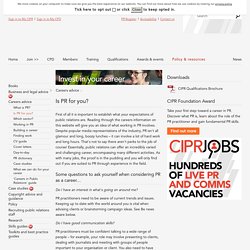
Reading through the careers information on this website will give you an idea of what working in PR involves. Despite popular media representations of the industry, PR isn't all glamour and long, boozy lunches – it can involve a lot of hard work and long hours. That's not to say there aren't perks to the job of course!
Essentially, public relations can offer an incredibly varied and challenging career, encompassing many different activities. As with many jobs, the proof is in the pudding and you will only find out if you are suited to PR through experience in the field. Learn Educate Discover - Discover What You Were Meant To Do. G3 MartinHolmes. How to Get a Job in Public Relations(PR) Not sure if Public Relations is for you?
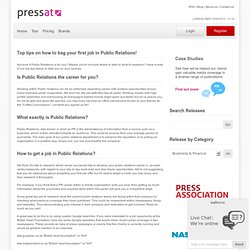
Maybe you're not sure where to start or what to research? Have a read of our top tips below to start you on your journey. Is Public Relations the career for you? Working within Public relations can be an extremely rewarding career with endless opportunities across every business sector imaginable. We won't lie, the job definitely has its perks. Public Relations Careers. Building a career in PR. Career development opportunities within the Public Relations profession are excellent but competition for jobs is fierce; PR ranks as 1 of the top 3 most popular career choices for graduates in the UK.
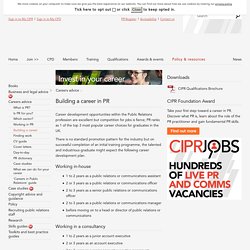
There is no standard promotion pattern for the industry but on successful completion of an initial training programme, the talented and industrious graduate might expect the following career development plan. What we can do for your career. We offer courses to suit PR and communication professionals of every type: junior PR professionals who have just completed their GCSEs or A-Levelsthose looking to study at undergraduate and postgraduate levelgraduates taking their first steps in the professionsenior managers keen to expand their current knowledge and skills.
Recognised university courses We currently recognise over 30 different courses across Great Britain and Northern Ireland. CIPR recognition raises awareness of the significant role the particular course plays in influencing and developing PR academics and professionals as part of the our commitment to promoting high standards within the public relations profession Fully recognised courses must cover the following 5 areas:
Chartered Institute of Public Relations. Marketing director. Public Relations Consultants Association.